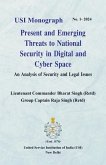Conflict in Cyber Space
Theoretical, Strategic and Legal Pespectives
Herausgeber: Friis, Karsten; Ringsmose, Jens
Conflict in Cyber Space
Theoretical, Strategic and Legal Pespectives
Herausgeber: Friis, Karsten; Ringsmose, Jens
- Gebundenes Buch
- Merkliste
- Auf die Merkliste
- Bewerten Bewerten
- Teilen
- Produkt teilen
- Produkterinnerung
- Produkterinnerung
Adopting a multidisciplinary perspective, this book explores the key challenges associated with the proliferation of cyber capabilities.
Andere Kunden interessierten sich auch für
![Present and Emerging Threats to National Security in Digital and Cyber Space Present and Emerging Threats to National Security in Digital and Cyber Space]() Lieutenant Commander Bharat SinghPresent and Emerging Threats to National Security in Digital and Cyber Space27,99 €
Lieutenant Commander Bharat SinghPresent and Emerging Threats to National Security in Digital and Cyber Space27,99 €![Information, Cyber and Space Domain and its Application in Future Land Warfare Information, Cyber and Space Domain and its Application in Future Land Warfare]() Pk MallickInformation, Cyber and Space Domain and its Application in Future Land Warfare62,99 €
Pk MallickInformation, Cyber and Space Domain and its Application in Future Land Warfare62,99 €![Cyber Security Education Cyber Security Education]() Cyber Security Education50,99 €
Cyber Security Education50,99 €![Routledge Companion to Global Cyber-Security Strategy Routledge Companion to Global Cyber-Security Strategy]() Routledge Companion to Global Cyber-Security Strategy263,99 €
Routledge Companion to Global Cyber-Security Strategy263,99 €![National Cyber Emergencies National Cyber Emergencies]() National Cyber Emergencies55,99 €
National Cyber Emergencies55,99 €![Theorising Cyber (In)Security Theorising Cyber (In)Security]() Noran Shafik FouadTheorising Cyber (In)Security169,99 €
Noran Shafik FouadTheorising Cyber (In)Security169,99 €![Cyber Security Education Cyber Security Education]() Cyber Security Education167,99 €
Cyber Security Education167,99 €-
-
-
Adopting a multidisciplinary perspective, this book explores the key challenges associated with the proliferation of cyber capabilities.
Produktdetails
- Produktdetails
- Verlag: Routledge
- Seitenzahl: 222
- Erscheinungstermin: 5. April 2016
- Englisch
- Abmessung: 240mm x 161mm x 17mm
- Gewicht: 502g
- ISBN-13: 9781138947788
- ISBN-10: 1138947784
- Artikelnr.: 43679285
- Herstellerkennzeichnung
- Libri GmbH
- Europaallee 1
- 36244 Bad Hersfeld
- gpsr@libri.de
- Verlag: Routledge
- Seitenzahl: 222
- Erscheinungstermin: 5. April 2016
- Englisch
- Abmessung: 240mm x 161mm x 17mm
- Gewicht: 502g
- ISBN-13: 9781138947788
- ISBN-10: 1138947784
- Artikelnr.: 43679285
- Herstellerkennzeichnung
- Libri GmbH
- Europaallee 1
- 36244 Bad Hersfeld
- gpsr@libri.de
Karsten Friis is Senior Adviser and Head of the Research Group on Security and Defence at Norwegian Institute of International Affairs (NUPI), Oslo, Norway. Jens Ringsmose is an Associate Professor and Head of Department at the Department of Political Science and Public Management, University of Southern Denmark.
Preface, Michael Rühle Introduction, Karsten Friis & Jens Ringsmose 1.
Competing Theoretical and Conceptual Approaches to Strategic Cybersecurity,
Hans-Inge Langø 2. From Cyber Threats to Cyber Risks, Karsten Friis and
Erik Reichborn-Kjennerud 3. Cyber Spillover Conflicts: Transitions from
Cyber Conflict to Conventional Foreign Policy Disputes?, Ryan C. Maness and
Brandon Valeriano 4. Power, Rivalry and Cyber Conflict: An Empirical
Analysis, Allison Pytlak and George E. Mitchell 5. Cybersecurity in Sweden
and China: Going on the Attack?, Johan Eriksson and Johan Lagerkvist 6. Who
Pays for Zero-days? Balancing Long-term Stability in Cyberspace against
Short-term National Security Benefits, Michel Herzog and Jonas Schmid 7.
How to Govern Cybersecurity?: The Limits of the Multi-stakeholder Approach
and the Need to Rethink Public-private Cooperation, Lilly Pijnenburg Muller
8. Cyber Warfare by Social Network Media, Thomas Elkjer Nissen 9. Politics
and the development of legal norms in cyberspace, Anders Henriksen 10.
Cyber Weapons: Oxymoron or a Real World Phenomenon to be Regulated?, Bill
Boothby 11. Law in the Militarization of Cyberspace: Framing a Critical
Research Agenda, Kristin Bergtora Sandvik
Competing Theoretical and Conceptual Approaches to Strategic Cybersecurity,
Hans-Inge Langø 2. From Cyber Threats to Cyber Risks, Karsten Friis and
Erik Reichborn-Kjennerud 3. Cyber Spillover Conflicts: Transitions from
Cyber Conflict to Conventional Foreign Policy Disputes?, Ryan C. Maness and
Brandon Valeriano 4. Power, Rivalry and Cyber Conflict: An Empirical
Analysis, Allison Pytlak and George E. Mitchell 5. Cybersecurity in Sweden
and China: Going on the Attack?, Johan Eriksson and Johan Lagerkvist 6. Who
Pays for Zero-days? Balancing Long-term Stability in Cyberspace against
Short-term National Security Benefits, Michel Herzog and Jonas Schmid 7.
How to Govern Cybersecurity?: The Limits of the Multi-stakeholder Approach
and the Need to Rethink Public-private Cooperation, Lilly Pijnenburg Muller
8. Cyber Warfare by Social Network Media, Thomas Elkjer Nissen 9. Politics
and the development of legal norms in cyberspace, Anders Henriksen 10.
Cyber Weapons: Oxymoron or a Real World Phenomenon to be Regulated?, Bill
Boothby 11. Law in the Militarization of Cyberspace: Framing a Critical
Research Agenda, Kristin Bergtora Sandvik
Preface, Michael Rühle Introduction, Karsten Friis & Jens Ringsmose 1.
Competing Theoretical and Conceptual Approaches to Strategic Cybersecurity,
Hans-Inge Langø 2. From Cyber Threats to Cyber Risks, Karsten Friis and
Erik Reichborn-Kjennerud 3. Cyber Spillover Conflicts: Transitions from
Cyber Conflict to Conventional Foreign Policy Disputes?, Ryan C. Maness and
Brandon Valeriano 4. Power, Rivalry and Cyber Conflict: An Empirical
Analysis, Allison Pytlak and George E. Mitchell 5. Cybersecurity in Sweden
and China: Going on the Attack?, Johan Eriksson and Johan Lagerkvist 6. Who
Pays for Zero-days? Balancing Long-term Stability in Cyberspace against
Short-term National Security Benefits, Michel Herzog and Jonas Schmid 7.
How to Govern Cybersecurity?: The Limits of the Multi-stakeholder Approach
and the Need to Rethink Public-private Cooperation, Lilly Pijnenburg Muller
8. Cyber Warfare by Social Network Media, Thomas Elkjer Nissen 9. Politics
and the development of legal norms in cyberspace, Anders Henriksen 10.
Cyber Weapons: Oxymoron or a Real World Phenomenon to be Regulated?, Bill
Boothby 11. Law in the Militarization of Cyberspace: Framing a Critical
Research Agenda, Kristin Bergtora Sandvik
Competing Theoretical and Conceptual Approaches to Strategic Cybersecurity,
Hans-Inge Langø 2. From Cyber Threats to Cyber Risks, Karsten Friis and
Erik Reichborn-Kjennerud 3. Cyber Spillover Conflicts: Transitions from
Cyber Conflict to Conventional Foreign Policy Disputes?, Ryan C. Maness and
Brandon Valeriano 4. Power, Rivalry and Cyber Conflict: An Empirical
Analysis, Allison Pytlak and George E. Mitchell 5. Cybersecurity in Sweden
and China: Going on the Attack?, Johan Eriksson and Johan Lagerkvist 6. Who
Pays for Zero-days? Balancing Long-term Stability in Cyberspace against
Short-term National Security Benefits, Michel Herzog and Jonas Schmid 7.
How to Govern Cybersecurity?: The Limits of the Multi-stakeholder Approach
and the Need to Rethink Public-private Cooperation, Lilly Pijnenburg Muller
8. Cyber Warfare by Social Network Media, Thomas Elkjer Nissen 9. Politics
and the development of legal norms in cyberspace, Anders Henriksen 10.
Cyber Weapons: Oxymoron or a Real World Phenomenon to be Regulated?, Bill
Boothby 11. Law in the Militarization of Cyberspace: Framing a Critical
Research Agenda, Kristin Bergtora Sandvik









